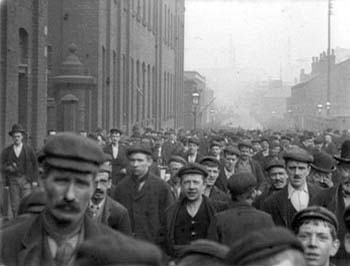Is a Fifth Industrial Revolution in the Works?

Sign up for Big Think on Substack
The most surprising and impactful new stories delivered to your inbox every week, for free.
Sustainability obviously means a lot to the founder of the Copenhagen Climate Council. But Erik Rasmussen, also the CEO of Scandinavian’s leading independent think tank Monday Morning, isn’t sugar coating the effectiveness of COP 15, whose effects he believes nearly closed down discussions of climate change.
Rasmussen believes we need to take the negative energy from Copenhagen and turn it into serious action. He thinks the worst thing we could do would be to say: “It was a political issue, it failed in Copenhagen, forget about it, the scientists couldn’t agree and let’s continue as we used to do and forget about climate change.” He emphasizes that we cannot become complacent when it comes to climate change, because it’s not going away.
When asked how he pictures our world in the near and not-so-near future, Rasmussen says he can’t help but be optimistic. He says historians may look back on this time period and say: “That was when we really developed what could be called the fifth industrial revolution. We have had four previous revolutions that created and threatened the modern civilization but the fifth one inaugurated, taking off around 2010, developed it, made it secure and created a new civilization based on a new quality of life.”
When asked how he pictures our world in the near and not-so-near future, Rasmussen says he can’t help but be optimistic. He says historians may look back on this time period and say: “That was when we really developed what could be called the fifth industrial revolution. We have had four previous revolutions that created and threatened the modern civilization but the fifth one inaugurated, taking off around 2010, developed it, made it secure and created a new civilization based on a new quality of life.”
These interviews are part of Big Think’s ongoing series “Balancing People, Planet and Profit: The Future of Business Sustainability,” sponsored by Logica. So far, the series has featured interviews with Peter Brabeck, the Chairman of Nestle; Gro Harlem Brundtland, Special Envoy on Climate Change, U.N.; Ernst Weizsäcker, Co-chair, U.N. International Panel for Sustainable Resource Management; Sir Martin Sorrell, CEO of WPP Group; Fatih Birol, Chief Economist at IEA; and Bjørn Lomborg, Environmental Economics Professor at Copenhagen Business School. The series examines ways that business interests can be better aligned with the greater social good.
Sign up for Big Think on Substack
The most surprising and impactful new stories delivered to your inbox every week, for free.




